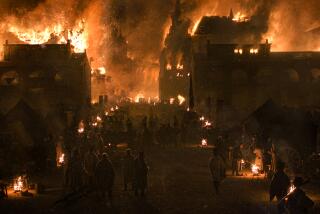Waterloo and the Rise of Modern Europe
- Share via
“The Final Act” is a splendid work of popular history that brings to life a period which shaped the Europe that exists today.
Gregor Dallas, who has written a well-regarded biography of French Premier Georges Clemenceau, takes as his great subject the fall of Napoleon and the rebuilding of war-ravaged Europe in 1814-15 with the Congress of Vienna.
The reader is taken to London, Paris, Vienna, Waterloo and the broad plain of Northern Europe across which nations have contested for millenniums.
Dallas’ principal characters are the opportunistic diplomat Charles Maurice de Talleyrand of France, Clemens Metternich of Austria, Tsar Alexander of Russia, Lord Castlereagh of England and Napoleon.
There are kings, princes and a considerable number of mistresses: As they sought to restore monarchies across Europe, the aristocrats engaged in an extraordinary amount of bed-hopping, all well-documented by Dallas.
Beethoven makes a startling appearance, and throughout the book the common people and the soldiers who did the fighting for their masters are much in evidence. Dallas depicts an age that in some ways we recognize but in others is utterly foreign.
In that age, Romanticism was in full flower. Metternich, who has come to us as a model Machiavellian, addresses letters to his mistress in tones of ecstasy and despair that would have done credit to Lord Byron. No one writes that way anymore.
On the other hand, Beethoven’s turbulent Seventh Symphony is so much a part of classical music today that it is threatened with warhorse-dom. Dallas takes us to its Vienna premiere, during the Congress, conducted in a frenzy by Beethoven himself. We read how the music was truly revolutionary then and still can be today, if only we can hear it conducted the way Beethoven had intended.
Born in England and educated at UC Berkeley and Rutgers University, Dallas lives near Paris and has embraced French history as his specialty. He acknowledges his debt to the modern French historians, notably Fernand Braudel, who conceptualized three levels of history: the short-term history of events; the cycles that replace each other; and the lasting structures, like capitalism, embedded in history.
In this book, Dallas writes about all three and gives special emphasis to the places where history happened. He believes that history is not an abstraction--although abstract lines of development can be discerned--but is expressed in the particular. This viewpoint gives his book a liveliness and a vivid coloring that so many history books lack.
On Christmas Eve, 1814, for example, an Austrian secret agent attended the holiday celebration of the Congress’ Prussian delegation. To his amazement, the Prussians brought a Christmas tree loaded with presents. Though a Central European himself, the agent had never seen a Christmas tree before.
The Congress of Vienna is often portrayed as a restoration of reactionary regimes in response to the challenge of the French Revolution.
Dallas, however, takes a more nuanced view. The Congress was anti-revolutionary, yes, but it allowed for a more liberal parliamentary France and preserved the better-developed liberties of the English people. Its concept of the balance of power held Europe together in peace for many years. And the Congress foreshadowed the present day’s European Union when it discussed (though in the end it did not create) a united Europe with a coordinating central body.
Dallas quotes the German philosopher Georg Wilhelm Friedrich Hegel as dismissing the Congress’ statesmen as “ant, flea and bug personalities” as compared to “the great Napoleon.” Yes, Dallas responds, “but the nineteenth century was filled with ant, flea and bug personalities.
“It was the twentieth century,” he mordantly continues, “that attempted . . . to impose great leaders in the world . . . a century of war.”
In this gripping tale, Dallas clearly prefers the pragmatic statesmen of the Congress of Vienna to dynamic dictators like Adolf Hitler, Josef Stalin and . . . Napoleon.
More to Read
Sign up for our Book Club newsletter
Get the latest news, events and more from the Los Angeles Times Book Club, and help us get L.A. reading and talking.
You may occasionally receive promotional content from the Los Angeles Times.





